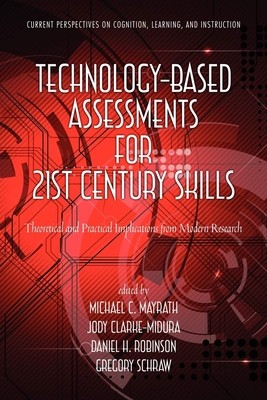
- We will send in 10–14 business days.
- Publisher: Information Age Publishing
- Year: 2012
- Pages: 398
- ISBN-10: 1617356336
- ISBN-13: 9781617356339
- Format: 15.6 x 23.4 x 2.2 cm, hardcover
- Language: English
- SAVE -10% with code: EXTRA
Technology-Based Assessments for 21st Century Skills (e-book) (used book) | bookbook.eu
Reviews
Description
Creative problem solving, collaboration, and technology fluency are core skills requisite of any nation's workforce that strives to be competitive in the 21st Century. Teaching these types of skills is an economic imperative, and assessment is a fundamental component of any pedagogical program. Yet, measurement of these skills is complex due to the interacting factors associated with higher order thinking and multifaceted communication. Advances in assessment theory, educational psychology, and technology create an opportunity to innovate new methods of measuring students' 21st Century Skills with validity, reliability, and scalability. In this book, leading scholars from multiple disciplines present their latest research on how to best measure complex knowledge, skills, and abilities using technology-based assessments. All authors discuss theoretical and practical implications from their research and outline their visions for the future of technology-based assessments.
EXTRA 10 % discount with code: EXTRA
The promotion ends in 6d.08:40:23
The discount code is valid when purchasing from 10 €. Discounts do not stack.
- Publisher: Information Age Publishing
- Year: 2012
- Pages: 398
- ISBN-10: 1617356336
- ISBN-13: 9781617356339
- Format: 15.6 x 23.4 x 2.2 cm, hardcover
- Language: English English
Creative problem solving, collaboration, and technology fluency are core skills requisite of any nation's workforce that strives to be competitive in the 21st Century. Teaching these types of skills is an economic imperative, and assessment is a fundamental component of any pedagogical program. Yet, measurement of these skills is complex due to the interacting factors associated with higher order thinking and multifaceted communication. Advances in assessment theory, educational psychology, and technology create an opportunity to innovate new methods of measuring students' 21st Century Skills with validity, reliability, and scalability. In this book, leading scholars from multiple disciplines present their latest research on how to best measure complex knowledge, skills, and abilities using technology-based assessments. All authors discuss theoretical and practical implications from their research and outline their visions for the future of technology-based assessments.


Reviews